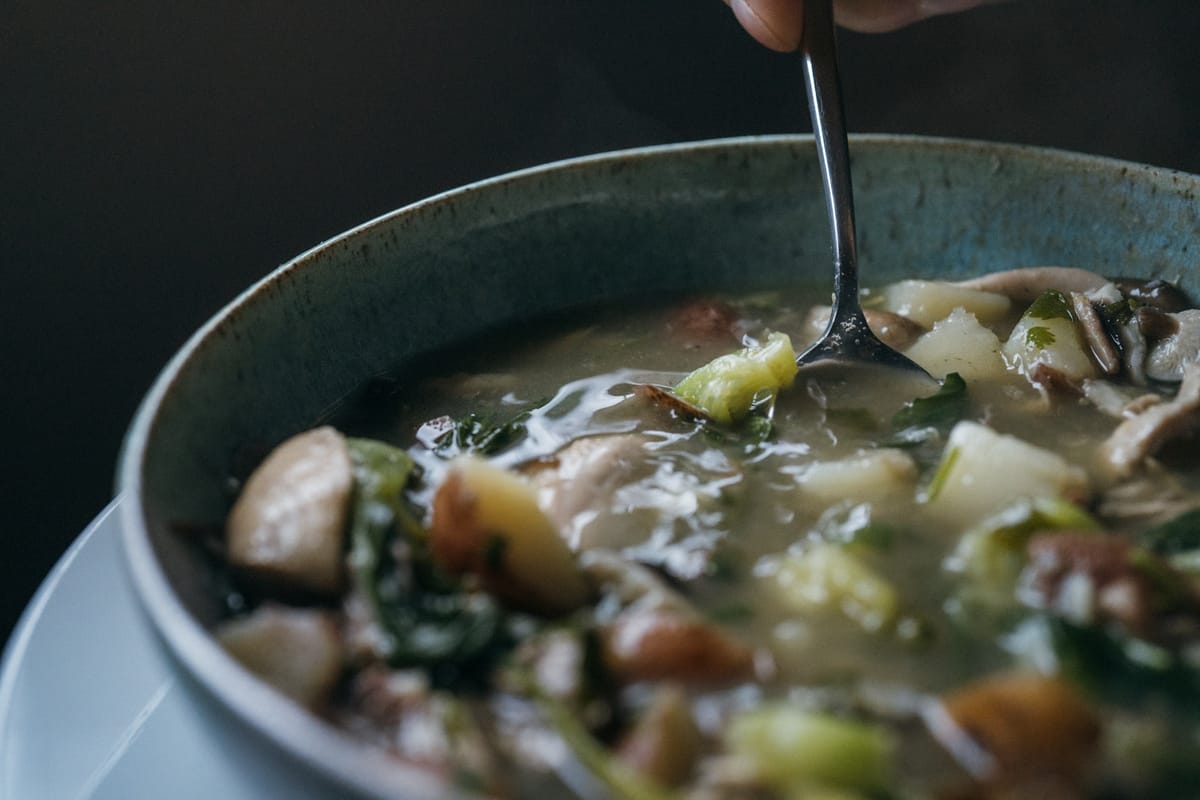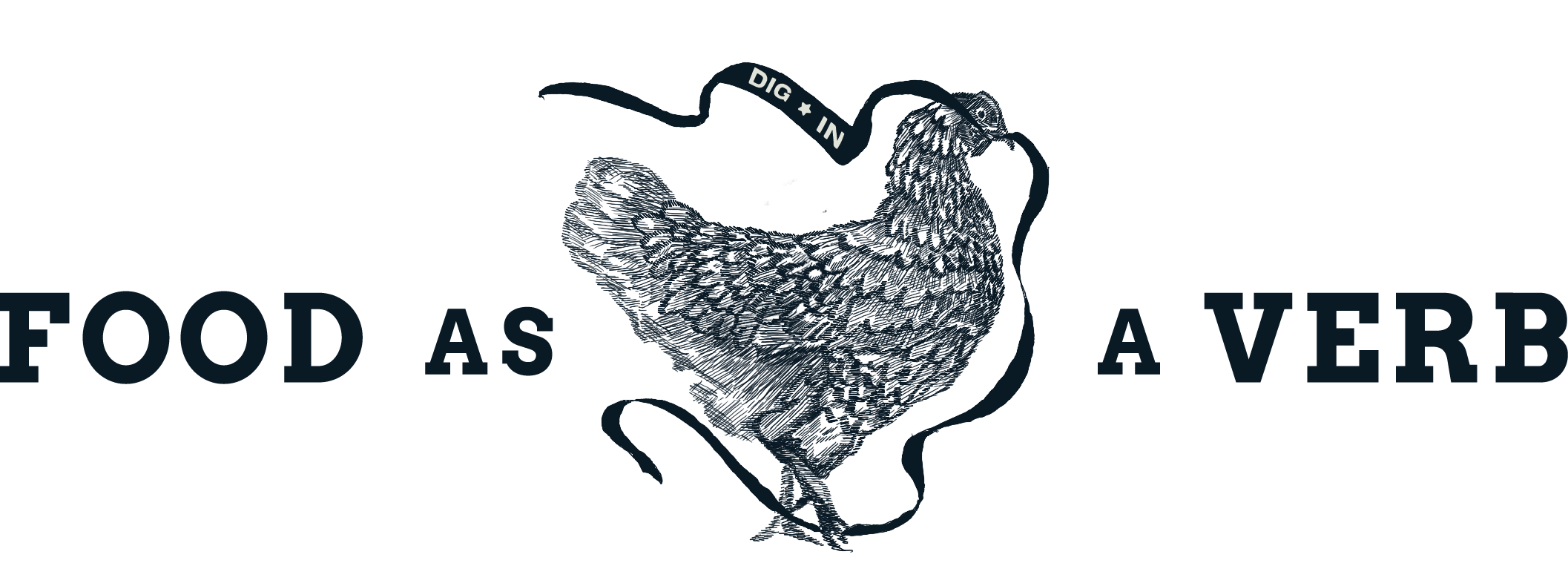"Build Your Plate" Episode 3: foods that help, not harm, your gut.
Our gut creates our future.


Wherever we go, whatever meal we're eating – from gas station pick-ups to white table cloth dinners – we create our present and future health by the selections on our plate. What we eat, our gut becomes. And what our gut becomes, our bodies become.
By building our plate with intention – not guilt, not pressure, but intention – we are able to craft our meals in ways that help, nor harm.
“We are laying the foundation for a healthy, nourished gut," Hannah Wright says.

Wright – a master’s level nutrition educator, coach and researcher – is the owner of Eat Well Be Well. (She's also a mom, wife and writer with a wholesomely authentic presence on Instagram.) In classes and online, she teaches health through one special doorway: kindness, not guilt or shame or fear.
"I never want anyone to feel guilt or shame," she said. "It can scare us. It hurts us. I don't like to use fear to motivate anyone."
"That means no gimmicks, no fads, no body or food shaming."
Earlier this year, we began a multi-part series with Wright called "Build Your Plate." The first episode?
We introduced you to Hannah.
Second? Balancing the Blood Sugar Blues.
Our third is, well, aptly named.
Build Your Plate.
As in: here's what to assemble, include and choose when you're eating each day.
"There isn’t a quick-fix gut protocol," she said. "Everyone is really different based on their baseline gut health. Some things that are considered gut-healthy might tear up your stomach, like kale or lettuce. Some people might feel better with more meat and fewer grains. These are general guidelines, but it's very individual."
It starts with protein. (Note to readers: Wright's quotes are taken from a combination of emails, conversations and past lessons she's published.)
"Protein is essential for gut health," Wright said. "You need amino acids to repair and build tissue, including the wall of your gut lining."
One of the most important amino acids?
"Glutamine," she said. "It's found in things like chicken, beef and yogurt. It's also in a few plant foods like red cabbage and tofu, but animal protein is the best source."
Quality matters.
- Avoid ultra-processed meats chock full of preservatives, coloring, nitrites and nitrates.
- Avoid excessive intake of smoked meats, preserved meats, and charred/blackened meats are also not good for gut health.
"These preparations chemically alter meat and increase the production of carcinogenic chemical products," she said.
One trick: marinate them in antioxidant-rich herbs and spices, like rosemary, garlic and citrus. ("And also let's remember that humans have been eating smoked meat for a very long time," she said.)

Proteins to search for?
- Grass-fed, pasture-raised, organic
- Fish, shellfish, crustaceans
- Beef: grass-fed
- Chicken: organic or pastured
- Pork: organic or woodlot-raised
"The feed that is given to conventionally raised pigs is horrifying," she said.
Why grass-fed, pastured and organic?
"These foods are less inflammatory because they contain a better fatty acid profile and organic foods in general also contain less pesticide residue because the animal was fed an all-organic diet," she said.
Vital nutrients like protein (and the amino acid glutamine), B vitamins and zinc are going to be the same whether pastured raised or conventionally raised, Wright said.
"But grass-fed stuff will be better in some areas," she said. "For example, pasture-raised eggs have much more omega-3 and vitamin A than conventional eggs. Similarly, grass-fed beef has more vitamins A, E, and omega-3."
Pasture-raised meat is the gold standard. But, it isn’t always an option for everyone.
And, always remember: "if these selections are outside of your budget, do the best you can. It's ok!" she counsels.
Next?
Dairy.

Food as a Verb thanks Tucker Build, our sustaining partner, for its generous support.
Tucker Build offers Chattanooga a commercial construction firm made up of design-build experts specializing in the planning, building and managing process.
When it comes to dairy, quality is key. Dairy is often highly processed, and such processing affects the natural enzymes and affects the quality of the fat.
She recommends milk from a trusted source.
"Fermented dairy – like yogurt and kefir – are outstandingly good for gut health because they contain probiotics: good bacteria for your gut. And they are generally really easy to digest," Wright said.
(On Wednesdays, Orchard House Creamery and Fall Creek Farms sell milk, yogurt and kefir at the Main Street Farmers' Market.)
However, there are multiple forms of dairy intolerance. Know your body, Wright says.
"When you are working on healing your gut, it is important to limit foods that create inflammation for you. So if dairy is not your friend, that's ok," she said.

Next on our plate?
"Fibrous veggies, which contain tons of polyphenols – the superfoods for your gut bugs, and vitamins and minerals," Wright said. "They also contain fibers that nourish your good gut flora."
Everyone's gut is different; some, more sensitive guts may not tolerate raw vegetables well.
"If that is the case, it is better to focus on well cooked vegetables and prioritize root veggies. These will be much more gentle on your gut," she said. "Do not force your self to eat salads and raw vegetables."
Starchy root vegetables are among the most nutrient-dense type of vegetables, offering plenty of good carbs and lots of nutrients.
"As a root, they are the storehouse of nutrients for the above-ground leafy plant, so they are packed with all the goodness. Root veggies are also often well tolerated. So that means if you are struggling with digesting salads and raw veggies, well cooked root veggies are what you want to include more of in your diet," she said.
Now, the tricky part.
Fat.
There's wonderful fat that is abundantly good for you.
And fat we need to avoid.
"When it comes to gut health, extra virgin olive oil is the most well documented for its amazing gut healing benefits," Wright said.
Not all olive oils are created equal, she continued. Some are blended with other oils.
Along with olive oil, Wright recommends ...
- Ghee
- Grass fed butter
- Coconut milk (Native Forest Simple's gum-free is a good choice.)
- Tallow and lard from healthy animals. (Many market farmers will sell this if asked.)
Next on our plate?
Grains and legumes. Yes, grains and legumes, which are not bad for the gut the way that trending news depicts.
Preparation is key.
"Beans and legumes are an excellent source of prebiotic fiber. Prebiotic fiber is fuel for your good gut microbes. This is probably why studies show that eating legumes provides tons of health benefits and is even associated with longevity in many populations," Wright said.
Soak your legumes and grains before cooking. It makes them easier to digest and creates less gas or bloating.
"If beans and grains hurt your gut, do not eat them," Wright cautions. "Work on healing your gut for a few months and them try a bit and see how you do."
No time to soak? Try Eden canned beans.

Now, one of our favorite plate additions.
Fruit.
"It contains lots of fiber, it is hydrating, and it contains tons of polyphenols, vitamins and minerals," Wright said.

"The trick with fruit is to eat it in a way that keeps your blood sugar balanced," she continued.
A big bowl of fruit in the morning? Hmmm, delicious.

Not so fast, Wright said.
"It is a sure way to mess with your blood sugar and screw up your energy for the day," she said. "But, having a protein forward meal with the fruit, or fruit as a snack with protein or fat, is a great way to give you stable energy and provide your gut with all the benefits fruit has to offer."
"Aim for 1-5 servings a day," she said.
That's nuts.
"No, no. Nuts," Wright said. "That's our next topic."
"Nuts and seeds contain fiber and polyphenols that help boost good gut bacteria," she continued. "They also are a great way to get optimal amounts of Omega-6 into your diet. Remember that even though Omega-6 is pro-inflammatory, we do need to consume it in moderation because it is an essential fatty acid, meaning our body can not make it."
One ounce a day is key.
Also key? Listening to our own bodies and lives. As Wright always says:
I never want anyone to feel guilt or shame. It can scare us. It hurts us. I don't like to use fear to motivate anyone.
That means no gimmicks, no fads, no body or food shaming.
See you Sunday, Food as a Verb community.

All photography by Julie Ellison.
All design by Alex DeHart.
All words by David Cook (david@foodasaverb.com)
Story ideas, questions, feedback? Interested in sponsorship or advertising opportunities? Email us: david@foodasaverb.com and sarah@foodasaverb.com
This story is 100% human generated; no AI chatbot was used in the creation of this content.
Food as a Verb thanks our sustaining partners for their generous support.






Society of Work is a shared coworking space designed with business flexibility in mind and the resources to help like-minded people connect and create amazing things together. From private offices to 24/7 coworking memberships, we provide the space you need to get work done. Thanks to two-time James-Beard nominee Erik Niel, Easy Bistro & Bar offers unparalleled and deeply thoughtful dining in the heart of West Village. Female-and-locally owned, Divine Goods offers beautifully curated gifts for every occasion. Be divine and send someone special a Divine Goods gift - locally sourced when possible, and always thoughtful. Niedlov's Bakery & Cafe, a Main St. anchor, has elevated our city's bakery experience to beautiful levels while strengthening community in immeasurable ways. For more than 25 years, Lupi's has served locally-sourced, creatively made and award-winningly delicious pizza pies from five nearby locations. The Chattanooga Area Food Bank believes that no one should go hungry, and through our network of over 250 hunger-relief partners, we provide equitable access to food and resources to end hunger today and build pathways for a healthy, hunger-free future tomorrow.

A list of regional farmers' markets
Regional Farmers' Markets
- Main St. Farmers' Market
Corner of W. 20th and Chestnut St., near Finley Stadium
Wednesday, 4 - 6pm
- Brainerd Farmers' Market
Grace Episcopal Church, 20 Belvoir Ave, Chattanooga, TN
Saturday, 10am - noon
- Chattanooga Market
1820 Carter Street, Sunday, 11am - 4pm
- Fresh Mess Market
Harton Park, Monteagle, TN. (Rain location: Monteagle Fire Hall.)
Every Thursday, 3pm - 6pm, beg. June 6 - Oct. 3
- Ooltewah Farmers' Market
The Ooltewah Nursery, Thursday, 3 - 6pm
Pre-order online for Thursday pick-up between 4 - 6pm at Bachman Community Center
- South Cumberland Farmers’ Market
Sewanee Community Center (behind the Sewanee Market on Ball Park Rd.) Tuesdays from 4:15 to 6:00 p.m. (central.) Order online by Monday 10 am (central.)
- St. Albans Farmers' Market
7514 Hixson Pike, Saturday, 9.30am - 12.30pm with a free pancake breakfast every third Saturday
- Walker County Farmers' Market
Wednesday, 2 - 5 pm, Rock Spring Ag. Center
Saturday, 9 am - 1 pm, downtown Lafayette, Georgia
To include your farmers market, email david@foodasaverb.com
